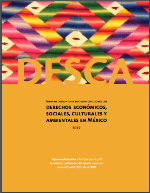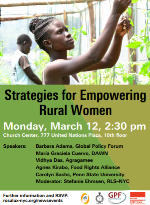Social Watch News
Published on Fri, 2018-03-16 10:07
International investment and trade agreements are legally binding international treaties which give investors an additional layer of legal protection on top of the host country law and contract law. However, little efforts have been made in ironing out the interface between these different laws and treaties. Inconsistencies and even contradictions have emerged in dispute settlement decisions, sometimes at the expense of public good, sovereignty and financial and economic stability. An asymmetry seems to exist in the allocation of risks and benefits between investors and recipients of investments. |
Published on Fri, 2018-03-09 19:19
"Civil society organizations are natural allies of the United Nations, but the partnership modality is not the primary way for civil society to engage with the UN" argued Barbara Adams at a panel discussion on "Strengthening partnerships and stakeholder engagement" that took place in the framework of the ECOSOC Operational Activities for Development on 27 February 2018. From a CSO perspective, she added, the primary way of leveraging resources for the Sustainable Development Goals is fair and progressive taxation. |
|
Published on Fri, 2018-03-09 17:25
» |
Published on Fri, 2018-03-09 00:00
Morocco is planning to build Africa's tallest building and a bullet train between its main cities, but local Social Watch groups argue that the people need instead basic infrastructure for clean water, health services and education. |
|
Source: . Published on Fri, 2018-03-09 00:00
Morocco is in a hurry. At Ouarzazate on the edge of the Sahara desert what's billed as the world's biggest solar plant – the size of 200 football pitches – is coming into operation. On the outskirts of Rabat, the country's capital, the foundations of what its backers claim will be Africa's tallest building – to be built by a Chinese state-owned company – are being laid. Mega projects |
Published on Thu, 2018-03-08 17:58
In the more than 11 years since Mexico’s last periodic review by the UN Committee on Economic, Social, and Cultural Rights, international scrutiny of the human rights situation in Mexico has centered largely on civil and political rights. However, the human rights crisis in our country also includes a multiplicity of economic, social, cultural, and environmental (“ESC”) rights violations committed by state and non-state actors, through acts and omissions that remain in impunity. In this context, the undersigned civil society organizations and networks submit this Alternative Report to the Committee with the aim of contributing to its important and urgent work in the supervision of the situation of ESC rights in Mexico. The report reflects our collective experience of many years in the investigation, documentation and defense of these rights, and seeks to clarify the current situation in the country, as well as identify key obstacles, setbacks, limitations, and challenges for the full enjoyment of ESC rights. |
Published on Sun, 2018-03-04 19:12
This public panel will discuss the multiple roles of rural women and girls for enhancing food sovereignty, preserving biodiversity, reducing inequalities, and combating climate change. The presentations will affirm the importance of engaging women in policy-making around more equitable and sustainable production and consumption. Panelists will offer perspectives from the local level, addressing challenges such as intellectual property rights and land ownership for small-scale women farmers. We will also discuss the opportunities and shortcomings of a human rights approach and global advocacy efforts to increasing women's participation in decision-making to tackle poverty, malnutrition, and environmental degradation. |
Published on Sat, 2018-03-03 08:57
The just released Canadian federal budget for 2018 takes some positive steps forward on gender equality and science funding, but comes up short on the bold policy moves that will make a real difference —universal child care, pharmacare, health care, and tax fairness. The government promised their citizens a budget guided by gender analysis this year, and in many ways it delivered: pay equity legislation for the public sector, ‘use it or lose it’ second parent leave, a long-awaited increase in funding to women’s organizations, and additional investments for addressing workplace harassment and funding to rape crisis centres. |
Published on Fri, 2018-03-02 14:25
An interview with Barbara Adams, on the problem of private finance within the UN development system, and the need for civil society action in response to these growing trends. Adams speaks about the United Nations' turn to the corporate sector and the trend for multi-stakeholder partnerships. This has been reinforced by the 2030 Agenda, and the push for its implementation and achievement of the SDGs. The accompanying policy influence, programme distortions, undermining of the 2030 Agenda and ability to achieve the Sustainable Development Goals have, however, not been adequately addressed. |
|
Published on Fri, 2018-03-02 00:00
» |
SUSCRIBE TO OUR NEWSLETTER










